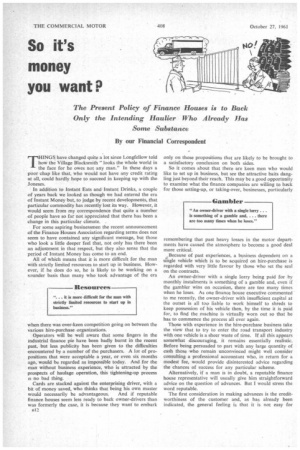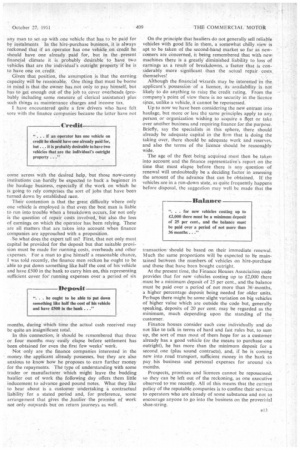So it's money you want P
Page 46

Page 47

If you've noticed an error in this article please click here to report it so we can fix it.
The Present Policy of Finance Houses is to Back Only the Intending Haulier Who Already Has Some Substance
By our Financial Correspondent
THINGS have changed quite a lot since Longfellow told how the Village Blacksmith "looks the whole world in the face for he owes not any man." In these days a poor chap like that, who would not have any credit ratirig at all, could hardly hope to succeed in keeping up with the Joneses.
In addition to Instant Eats and Instant Drinks, a couple of years back we looked as though we had entered the era of Instant Money but, to judge by recent developments, that particular commodity has recently lost its way. However, it would seem from my correspondence that quite a number of people have so far not appreciated that there has been a change in this particular climate. .
For some aspiring businessmen the recent announcement of the Finance Houses Association regarding terms does not seem to have contained any significant message, but those who look a little deeper feel that, not only has there been an adjustment in that respect, but they also sense that the period of Instant Money has come to an end.
All of which means that it is more difficult for the man with strictly limited resources to start up in business. However, if he does do so, he is likely to be working on a sounder basis than many who took advantage of the era when there was over-keen competition going on between the various hire-purchase organizations.
Operators will be well aware that some fingers in the industrial finance pie have been badly burnt in the recent past, but less publicity has been given to the difficulties encountered by a number of the purchasers. A lot of propositions that were acceptable a year, or even six months ago, would be regarded as impossible today. And for the man without business experience, who is attracted by the prospects of haulage operation, this tightening-up process is no bad thing.
Cards are stacked against the enterprising driver, with a bit of money saved, who thinks that being his own master would necessarily be advantageous. And if reputable finance houses seem less ready to back owner-drivers than was formerly the case, it is because they want to embark nt2 only on those propositions that are likely to be brought to a satisfactory conclusion on both sides.
So it comes about that there are keen men who would like to set up in business, but see the attractive baits dangling just beyond their reach. This may be a good opportunity to examine what the finance companies are willing to back for those setting-up, or taking-over, businesses, particularly remembering that past heavy losses in the motor departments have caused the atmosphere to become a good deal more critical
„.Because of past experiences, a business dependent on a smgle vehicle which is to be acquired on hire-purchase is regarded with very little favour by those who set the seal on the contracts.
An owner-driver with a single lorry being paid for by monthly instalments is something of a gamble and, even if the gambler wins on occasion, there are too many times when he loses. As one finance house executive commented to me recently, the owner-driver with insufficient capital at the outset is all too liable to work himself to shreds to keep possession of his vehicle then, by the time it is paid for, to find the machine is virtually worn out so that he has to commence the process all over again.
Those with experience in the hire-purchase business take the view that to try to enter the road transport industry with one vehicle is a sheer waste of time. if all this appears somewhat discouraging, it remains essentially realistic. Before being persuaded to part with any large quantity of cash those who remain unconvinced might well consider consulting a professional accountant who, in return for a modest fee, would provide disinterested advice regarding the chances of success for any particular scheme.
Alternatively, if a man is in doubt, a reputable finance house representative will usually give him straightforward advice on the question of advances. But I would stress the word reputable.
The first consideration in making advances is the creditworthiness of the customer and, as has already been indicated, the general feeling is that it is not easy for any man to set up with one vehicle that has to be paid for by instalments In the hire-purchase business, it is always reckoned that if an operator has one vehicle on credit he should have one already paid for, but in the present financial climate it is probably desirable to have two vehicles that are the individual's outright property if he is to have one on credit.
Given that position, the assumption is that the earning capacity will be reasonable. One thing that must be borne in mind is that the owner has not only to pay himself, but has to get enough out of the job to cover overheads (probably including some measure of clerical assistance) plus such things as maintenance charges and income tax.
I have encountered quite a few drivers who have felt sore with the finance companies because the latter have not come across with the desired help, but those now-canny institutions can hardly be expected to back a beginner in the haulage business, especially if the work on which he is going to rely comprises the sort of jobs that have been iurned down by established men.
Their contention is that the great difficulty where only one vehicle is employed is that even the best man is liable to run into trouble when a breakdown occurs, for not only is the question of repair costs involved, but also the loss of earnings on which the operator has been relying. These are all matters that are taken into account when finance companies are approached with a proposition.
So what does the expert tell us? First, that not only must capital be provided for the deposit but that suitable provision must be made for running costs, overheads and other expenses. For a man to give himself a reasonable chance, I was told recently, the finance men reckon he ought to be able to put down something like half the cost of his vehicle and have £500 in the bank to carry him on, this representing sufficient cover for running expenses over a period of six months, during which time the actual cash received may be quite an insignificant total.
In this connection, it should be remembered that three or four months may easily elapse before settlement has been obtained for even the firs( few weeks' work.
Not only are the finance companies interested in the money the applicant already possesses, but they are also anxious to know how he proposes to earn further money for the repayments. The type of understanding with some trader or manufacturer which might leave the budding haulier out of work the following day offers them little inducement to advance good pound notes. What they like to hear about is a customer undertaking a contractual liability for a stated period and, for preference, some arrangement that gives the .haulier the promise of work not only outwards but on return journeys as well. On the principle that hauliers do not generally sell reliable vehicles with good life in them, a somewhat chilly view is apt to be taken of the second-hand market so far as newcomers are concerned, it being remembered that with new machines there is a greatly diminished liability to loss of earnings as a result of breakdowns, a factor that is considerably more significant than the actual repair costs themselves!
Although the financial wizards may be interested in the applicant's possession of a licence, its availability is not likely to do anything to raise the credit rating. From the company's point of view there is no security in the licence since, unlike a vehicle, it cannot be repossessed.
Up to now we have been considering the new entrant into haulage, but more or less the same principles apply to any person, or organization wishing to acquire a fleet or take over another business and requiring finance for the purpose. Briefly, say the specialists in this sphere, there should already be adequate capital in the firm that is doing the taking over, there should be adequate work and reserves, and also the terms of the licence should be reasonably wide.
The age of the fleet being acquired must then be taken into account and the finance representative's report on the time that must elapse before there is any question of renewal will undoubtedly be a deciding factor in assessing the amount of the advance that can be obtained. If the vehicles are in a run-down state, as quite frequently happens before disposal, the suggestion may well be made that the transaction should be based on their immediate renewal. Much the same proportions will be expected to be maintained bettveen the numbers of vehicles on hire-purchase and those that have been bought outright.
At the present time, the Finance Houses Association code provides that for new vehicles costing up to £2,000 there must be a minimum deposit of 25 per cent., and the balance must be paid over a period of not more than 36-months, a higher percentage deposit being needed for older units, Perhaps there might be some slight variation on big vehicles of higher value which are outside the code but, generally speaking, deposits of 20 per cent, may be regarded as the minimum, much depending upon the standing of the customer.
Finance houses consider each case individually and do not like to talk in terms of hard and fast rules but, to sum up, the sort of man most of them hope for as a customer already has a good vehicle (or the means to purchase one outright), he has more than the minimum deposit for a second one (plus sound contracts), and, if he is coming new into road transport, sufficient money in the bank to pay his business and personal expenses for around six months.
Prospects, promises and licences cannot be repossessed. so they can be left out of the reckoning, as one executive observed to me recently. All of this means that the current policy of the reputable companies is to confine their services to operators who are already of some substance and not to encourage anyone to go into the business on the proverbial shoe-string.




















































































































